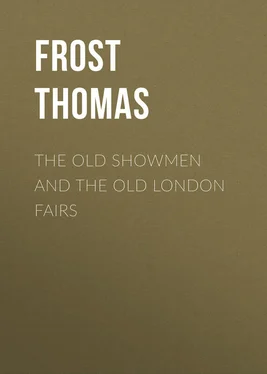Thomas Frost - The Old Showmen and the Old London Fairs
Здесь есть возможность читать онлайн «Thomas Frost - The Old Showmen and the Old London Fairs» — ознакомительный отрывок электронной книги совершенно бесплатно, а после прочтения отрывка купить полную версию. В некоторых случаях можно слушать аудио, скачать через торрент в формате fb2 и присутствует краткое содержание. Жанр: foreign_antique, foreign_prose, на английском языке. Описание произведения, (предисловие) а так же отзывы посетителей доступны на портале библиотеки ЛибКат.
- Название:The Old Showmen and the Old London Fairs
- Автор:
- Жанр:
- Год:неизвестен
- ISBN:нет данных
- Рейтинг книги:4 / 5. Голосов: 1
-
Избранное:Добавить в избранное
- Отзывы:
-
Ваша оценка:
- 80
- 1
- 2
- 3
- 4
- 5
The Old Showmen and the Old London Fairs: краткое содержание, описание и аннотация
Предлагаем к чтению аннотацию, описание, краткое содержание или предисловие (зависит от того, что написал сам автор книги «The Old Showmen and the Old London Fairs»). Если вы не нашли необходимую информацию о книге — напишите в комментариях, мы постараемся отыскать её.
The Old Showmen and the Old London Fairs — читать онлайн ознакомительный отрывок
Ниже представлен текст книги, разбитый по страницам. Система сохранения места последней прочитанной страницы, позволяет с удобством читать онлайн бесплатно книгу «The Old Showmen and the Old London Fairs», без необходимости каждый раз заново искать на чём Вы остановились. Поставьте закладку, и сможете в любой момент перейти на страницу, на которой закончили чтение.
Интервал:
Закладка:
A passage in one of Davenant’s poems affords some information concerning the character of the shows which formed the attraction of the fairs at this period,
“Now vaulter good, and dancing lass
On rope, and man that cries, Hey, pass!
And tumbler young that needs but stoop,
Lay head to heel, to creep through hoop;
And man in chimney hid to dress
Puppet that acts our old Queen Bess,
And man that, while the puppets play,
Through nose expoundeth what they say;
And white oat-eater that does dwell
In stable small at sign of Bell,
That lifts up hoof to show the pranks
Taught by magician styled Banks;
And ape led captive still in chain
Till he renounce the Pope and Spain;
All these on hoof now trudge from town,
To cheat poor turnip-eating clown.”
The preceding chapter will have rendered the allusions intelligible to the reader of the present day.
Among the shows of this period was another bearded woman, whom Pepys saw in Holborn, towards the end of 1668. “She is a little plain woman,” he writes, “a Dane; her name, Ursula Dyan; about forty years old; her voice like a little girl’s; with a beard as much as any man I ever saw, black almost, and grizzly; it began to grow at about seven years old, and was shaved not above seven months ago, and is now so big as any man’s almost that I ever saw; I say, bushy and thick. It was a strange sight to me, I confess, and what pleased me mightily.” There was a female giant, too, of whom Evelyn says, under date the 13th of February, 1669, “I went to see a tall gigantic woman, who measured six feet ten inches at twenty-one years old, born in the Low Countries.”
Salamandering feats are not so pleasant to witness as the performances of the acrobat and the gymnast, but they create wonder, and, probably, were wondered at more two hundred years ago than at the present time, when the scientific principles on which their success depends are better understood. The earliest performer of the feats which made Girardelli and Chabert famous half a century ago seems to have been Richardson, of whom the following account is given by Evelyn, who witnessed his performance in 1672: —
“I took leave of my Lady Sunderland, who was going to Paris to my lord, now ambassador there. She made me stay dinner at Leicester House, and afterwards sent for Richardson, the famous fire-eater. He devoured brimstone on glowing coals before us, chewing and swallowing them; he melted a beer-glass and eat it quite up; then, taking a live coal on his tongue, he put on it a raw oyster, the coal was blown on with bellows till it flamed and sparkled in his mouth, and so remained till the oyster gaped and was quite boiled. Then he melted pitch and wax with sulphur, which he drank down as it flamed; I saw it flaming in his mouth, a good while; he also took up a thick piece of iron, such as laundresses use to put in their smoothing-boxes, when it was fiery hot, held it between his teeth, then in his hands and threw it about like a stone; but this I observed he cared not to do very long; then he stood on a small pot, and, bending his body, took a glowing iron with his mouth from between his feet without touching the pot or ground with his hands; with divers other prodigious feats.”
There are few notices of the London fairs in contemporary memoirs and journals, and as few advertisements of showmen have been preserved by collectors of such literary curiosities, between the last visit to Southwark Fair recorded by Pepys and the period of the Revolution. The public mind was agitated during this time by plots and rumours of plots, by State trials and Tower Hill executions, which alternately excited men to rage and chilled them with horror. Giants and dwarfs, and monstrosities of all kinds, seem to have been more run after, under the influence of these events, than puppets and players. Take the following as an example, an announcement which was printed in 1677: —
“At Mr. Croomes, at the signe of the Shoe and Slap neer the Hospital-gate, in West Smithfield, is to be seen The Wonder of Nature , viz., A girl about sixteen years of age, born in Cheshire, and not much above eighteen inches long, having shed the teeth seven several times, and not a perfect bone in any part of her, onely the head, yet she hath all her senses to admiration, and discourses, reads very well, sings, whistles, and all very pleasant to hear. God save the King!”
The office of Master of the Revels, which had been held by Thomas Killigrew, the Court jester, was conferred, at his death, upon his son, who leased the licensing of ballad-singers to a bookseller named Clarke, as appears from the following announcement, which was inserted in the London Gazette in 1682: —
“Whereas Mr. John Clarke, of London, bookseller, did rent of Charles Killigrew, Esq., the licensing of all ballad-singers for five years; which time is expired at Lady Day next. These are, therefore, to give notice to all ballad-singers, that take out licenses at the office of the revels, at Whitehall, for singing and selling of ballads and small books, according to an ancient custom. And all persons concerned are hereby desired to take notice of, and to suppress, all mountebanks, rope-dancers, prize-players, ballad-singers, and such as make show of motions and strange sights, that have not a license in red and black letters, under the hand and seal of the said Charles Killigrew, Esq., Master of the Revels to his Majesty.”
The only entertainment of which I have found an announcement for this year is the following: – “At Mr. Saffry’s, a Dutch-woman’s Booth, over against the Greyhound Inn, in West Smithfield, during the time of the fair, will be acted the incomparable Entertainment call’d The Irish Evidence, with the Humours of Teige. With a Variety of Dances. By the first Newmarket Company.” Further glimpses of the fair are afforded, however, by the offer of a reward for “the three horses stolen by James Rudderford, a mountebank, and Jeremiah March, his clown;” and the announcement that, “The German Woman that danc’d where the Italian Tumbler kept his Booth, being over against the Swan Tavern, by Hosier Lane end in Bartholomew Fair, is run away from her Mistress, the Fifth of this instant; She is of a Brownish complexion, with Brown Hair, and between 17 and 18 years of Age; if any person whatsoever can bring Tidings to one Mr. Hone’s, at the Duke of Albemarle’s Head, at the end of Duck Lane, so that her Mistress may have her again, they shall be rewarded to their own content.”
In the winter of 1683-4, an addition was temporarily made to the London fairs by the opportunity which the freezing of the Thames afforded for holding a fair on the ice. The river became frozen on the 23rd of December, and on the first day of 1684 the ice was so thick between the bridges that long rows of booths were erected for the sale of refreshments to the thousands of persons who congregated upon it. Evelyn, who visited the strange scene more than once, saw “people and tents selling all sort of wares, as in the City.” The frost becoming more intense when it had endured a month, the sports of horse-racing and bull-baiting were presented on the ice; and sledges and skaters were seen gliding swiftly in every direction, with, as Evelyn relates, “puppet-plays and interludes, tippling, and other lewd places.” The ice was so thick that the booths and stalls remained even when thaw had commenced, but the water soon rendered it disagreeable to walk upon, and long cracks warned the purveyors of recreation and refection to retreat to the land. The fair ended on the 5th of February.
It was during the continuance of this seventeenth century Frost Fair that Evelyn saw a human salamander, when he dined at Sir Stephen Fox’s, and “after dinner came a fellow who eat live charcoal, glowingly ignited, quenching them in his mouth, and then champing and swallowing them down. There was a dog also which seemed to do many rational actions.” The last sentence is rather obscure; the writer probably intended to convey that the animal performed many actions which seemed rational.
Читать дальшеИнтервал:
Закладка:
Похожие книги на «The Old Showmen and the Old London Fairs»
Представляем Вашему вниманию похожие книги на «The Old Showmen and the Old London Fairs» списком для выбора. Мы отобрали схожую по названию и смыслу литературу в надежде предоставить читателям больше вариантов отыскать новые, интересные, ещё непрочитанные произведения.
Обсуждение, отзывы о книге «The Old Showmen and the Old London Fairs» и просто собственные мнения читателей. Оставьте ваши комментарии, напишите, что Вы думаете о произведении, его смысле или главных героях. Укажите что конкретно понравилось, а что нет, и почему Вы так считаете.












